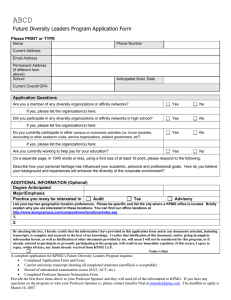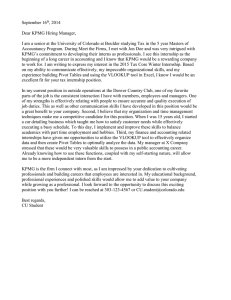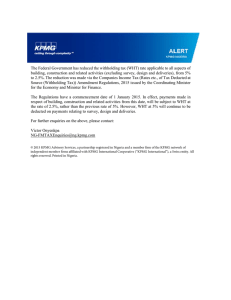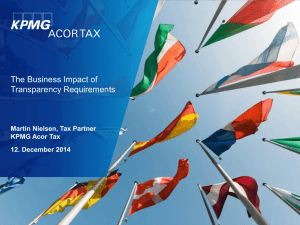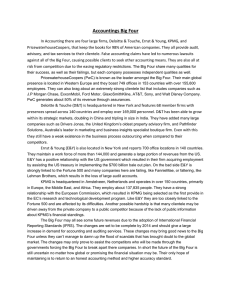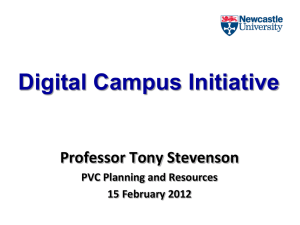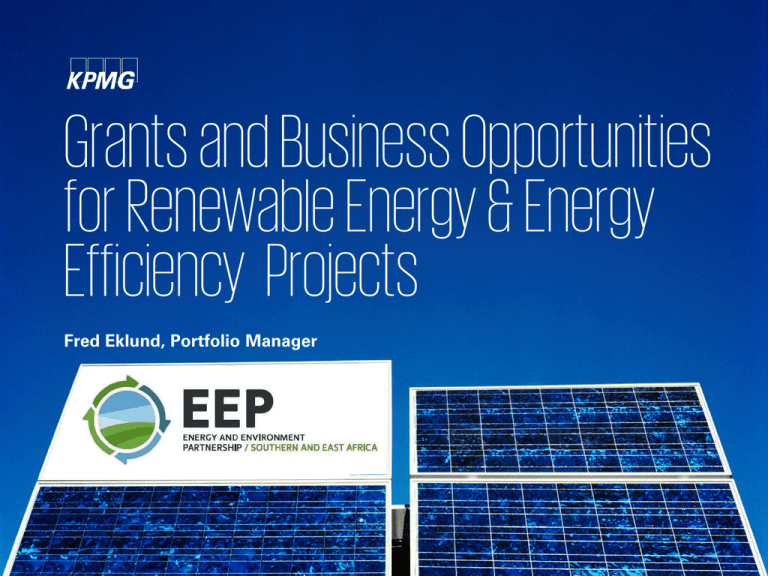
Grants and Business Opportunities
for Renewable Energy & Energy
Efficiency Projects
Fred Eklund, Portfolio Manager
© 2016 KPMG Oy Ab, a Finnish limited liability company and a member firm of the KPMG network of independent member firms affiliated
with KPMG International Cooperative, a Swiss entity. All rights reserved.
EEP S&EA in brief
— The overall objective of the Programme is to
reduce poverty through inclusive and job creating
green economy and improved energy access and
security in the Southern and East Africa regions
while mitigating global climate change
— The Programme was initiated in 2009 by the
Ministry for Foreign Affairs of Finland (MFA), with
co-funding from the UK’s Department for
International Development (DFID) and the
Austrian Development Agency (ADA)
— The initial phase of the Programme was
completed in June 2013. The second phase of
the Programme is currently midway
— Management and implementation hosted by
KPMG ECO (EEP Coordination Office, Pretoria,
South-Africa)
— The EEP Programme is currently also running in
three other regions: Andean region in Latin
America, Mekong region and Indonesia in Asia.
© 2016 KPMG Oy Ab, a Finnish limited liability company and a member firm of the KPMG network of independent member firms affiliated
with KPMG International Cooperative, a Swiss entity. All rights reserved.
EEP S&EA funding
— The Programme operate as a challenge
fund and invites proposals from e.g.
companies, NGOs and research
organisations working in the field of RE/EE
— The Programme is focused on projects in
all fields of renewable energy, bridging the
gap between a good idea and a bankable
project by providing part-financing to
project proposals
— The key is to have a sustainable business
idea
— 205 projects have been selected for
funding to date. A total funding of 51
million euros have been committed
— The total investment of the portfolio
reaches over 160 million euro
© 2016 KPMG Oy Ab, a Finnish limited liability company and a member firm of the KPMG network of independent member firms affiliated
with KPMG International Cooperative, a Swiss entity. All rights reserved.
EEP S&EA portfolio
Regional – 11 projects
Rwanda – 12 projects
Uganda – 9 projects
Burundi – 8 projects
Kenya – 41 projects
Zambia – 14 projects
Tanzania – 35 projects
Seychelles – 1 project
Namibia – 13 projects
Mozambique – 12 projects
Botswana – 9 projects
Swaziland – 3 projects
South Africa – 35 projects
Lesotho – 2 projects
EEP portfolio consists of 205 projects in 13 S&EA countries
© 2016 KPMG Oy Ab, a Finnish limited liability company and a member firm of the KPMG network of independent member firms affiliated
with KPMG International Cooperative, a Swiss entity. All rights reserved.
EEP S&EA project sectors
Solar PV
Biogas
Solar thermal
Wind power
Biofuels - liquid
Hydropower
and Wave
Solid biomass Waste-to-Energy
and Cook stoves
Multi-energy
and Hybrid
Energy
Efficiency
EEP supports projects in various sectors. Solar PV and Solid biomass are
currently the largest two sectors
© 2016 KPMG Oy Ab, a Finnish limited liability company and a member firm of the KPMG network of independent member firms affiliated
with KPMG International Cooperative, a Swiss entity. All rights reserved.
EEP Success stories – Solar PV
Mobisol – Smart High Quality Solar Solutions
— 35,000 households (30,000 Tanzania and 5,000 Rwanda)
— 3.5 MW solar capacity
— Saved over 15,500 tons/year of CO2 emissions
— Has received many awards ex.
- “Momentum for Change” Award by the United Nations Framework Convention on
Climate Change
- PV Magazine Award for “Top Business Model 2015”
— The EEP grant supported the early developing stages of Mobisol.
© 2016 KPMG Oy Ab, a Finnish limited liability company and a member firm of the KPMG network of independent member firms affiliated
with KPMG International Cooperative, a Swiss entity. All rights reserved.
EEP Success stories – Solar PV
Gigawatt Global - solar field in Rwanda
— 8.5 MW solar photovoltaic power in Rwanda
— Increased Rwanda's power generation capacity by approximately 8%.
— The EEP grant played a crucial role in the early stages of the development of the solar
farm.
— Gigawatt Global received EEP for funding during the feasibility phase of the project.
© 2016 KPMG Oy Ab, a Finnish limited liability company and a member firm of the KPMG network of independent member firms affiliated
with KPMG International Cooperative, a Swiss entity. All rights reserved.
EEP Success stories – Solid Biomass
Eco-fuel Africa - EEP S&EA “Project of the Year 2015”
— Works with local communities in Uganda to convert locally sourced farm and municipal
waste into clean cooking fuel briquettes
— Has created over 5,800 jobs for the people at the base of the pyramid by creating
income sources for farmers and micro-retailers
— Today they reach over 56,000 households on a daily basis and has enabled 20,000 kids
to enroll and stay in school
— It brings an added social value to the local community by its decentralized approach
that keeps the profits among local farmers, briquette producers, retailers and
consumers
© 2016 KPMG Oy Ab, a Finnish limited liability company and a member firm of the KPMG network of independent member firms affiliated
with KPMG International Cooperative, a Swiss entity. All rights reserved.
EEP Success stories – Cook stoves
BURN - clean burning cook stoves
— BURN is manufacturing and distributes cook stoves that are produced in the first local,
modern manufacturing facility for clean burning cook stoves in East Africa.
— In the month of August 2015, BURN succeeded to produce and sell a total of 10.000
cook stoves. In total they have already produced close to 140.000 cook stoves and
changed the lives of 700.000 people, saving them over $15 million.
— Their intention is to sell 3.45 million cook stoves
— Gender equality is a fundamental development objective of the BURN concept, and is
essentially contributing to enabling women and men to participate equally in society
and in the economy.
© 2016 KPMG Oy Ab, a Finnish limited liability company and a member firm of the KPMG network of independent member firms affiliated
with KPMG International Cooperative, a Swiss entity. All rights reserved.
EEP Success stories - Biogas
Bio2Watt - Industrial biogas producing
4.4 MW
— Bio2Watt received EEP for funding
during the feasibility phase of the
project.
— The first industrial biogas project in
Bronkhorstspruit producing 4.4 MW
from cattle and sheep manure and
other wastes.
— Is now producing and selling renewable
energy to BMW.
© 2016 KPMG Oy Ab, a Finnish limited liability company and a member firm of the KPMG network of independent member firms affiliated
with KPMG International Cooperative, a Swiss entity. All rights reserved.
How to apply - Calls for Proposals
EEP S&EA is in the process of launching two new Calls for Proposals (CfP12 and 13),
the first one focusing on early stage support for projects and the second one on
market ready projects
What do we
support?
Project stage
Activities
CfP12
CfP13
EARLY STAGE support for the
INTRODUCTION phase of projects
MARKET READY support for the
GROWTH stage of projects
Grant size 100,000-300,000 euro
Minimum co-financing is 30 % of the
total project cost
Grant size 100,000-1,000,000 euro
Co-financing share progressively 30-90 % of
the total project cost
Feasibility studies
Pilot projects
Demonstration projects
Scale up to commercial operation
Replication of commercially proven
concepts to new markets
(nationally or internationally)
Rejuvenation of existing renewable
energy and energy efficiency
generation
Please follow EEP-website for further information and subscribe to our EEP
Newsletter at www.eepafrica.org
© 2016 KPMG Oy Ab, a Finnish limited liability company and a member firm of the KPMG network of independent member firms affiliated
with KPMG International Cooperative, a Swiss entity. All rights reserved.
What constitutes a good application
— EEP aims to reduce poverty through inclusive and job-creating
green economy and improved energy access and security in the
Southern and East Africa regions while mitigating global climate
change
— Specific attention will be given to:
- gender issues
- poverty reduction
- innovation
- difficult markets
— The project should:
- Have a good idea
- Have a strong business case
- Empower local people
- Show commitment
- Have a local partner
- Be realistic and responsible.
© 2016 KPMG Oy Ab, a Finnish limited liability company and a member firm of the KPMG network of independent member firms affiliated
with KPMG International Cooperative, a Swiss entity. All rights reserved.
CfP12 – Early Stage Window
Feasibility Study
Analysis and evaluation of a proposed project to determine technological, commercial, social and environmental viability, as well as
feasibility within the estimated cost and economic viability. The Feasibility Study may be a refinement of a pre-feasibility study and
should present enough information for investors to finance the next stage of the project. Investors may typically be part of the
feasibility work to ensure smooth transition from the feasibility to a pilot or demonstration financing. The expected output from a
feasibility project is a “bankable feasibility study” acceptable for financiers with all the necessary agreements in place e.g. permits and
licenses, environmental impact assessment (EIA) approvals, access to land and other business specific requirements according to the
laws of the country where the project is to be implemented. Optimal is further to reach feedstock supply agreements and power
purchase agreements.
Pilot Project
Testing of an RE/EE product, service, and business or delivery model, including social and local appropriateness on a small scale, for the
first time, or in a new market, in order to ensure the conditions and operational details regarding e.g. feasibility, time, cost, size and
risks before large scale roll out or commercialization. Pilot projects should form part of an overall market development strategy. For a
pilot project to be approved for an EEP grant, the project proposal should clearly indicate further steps envisaged towards larger roll out
or commercialization after the piloting phase.
As opposed to a demonstration project, a pilot project does yet possess earlier proven evidence that a product/service or a technology
works in the selected circumstances but is intended to test and develop new products, services, and/or business or delivery models so
that the project can optimize the procedures and gather lessons learned for a roll out or a commercialization in the following phases of
the project.
Demonstration project
A project has in the pilot phase gained experience that the tested product/service or a technology can be successfully implemented in
the selected location for implementation. In the demonstration phase the project strives to establish evidence that a project, a
product/service and business or delivery model is a viable concept in the chosen market context, such as the geographical or socioeconomic area, and could be applied elsewhere in similar circumstances. This may show the performance of a product/service or a
technology in actual conditions, or it may encourage introducing the product/services or technology in the target market. For a
demonstration project to be approved for EEP grant, the project proposal should clearly indicate the specific context and describe
further steps towards roll out or commercialization. The demonstration project proposal should also provide basis for a high probability
that the product/service or a technology can be successfully implemented in the selected location for implementation, such as
experiences gained from other markets, or in test environments or through a pilot project.
© 2016 KPMG Oy Ab, a Finnish limited liability company and a member firm of the KPMG network of independent member firms affiliated
with KPMG International Cooperative, a Swiss entity. All rights reserved.
CfP13 – Market Ready Window
Scale up to Commercial operation
A project has proven evidence that a concept, a product/service or a technology and business or delivery model works, and
there is a high probability of reaching commercial viability with the applied “bridging finance” from EEP. Evidence might
have been gathered through a demonstration project but also in some cases from a pilot project which has proven to be a
successful concept.
For the CFP13, the focus is on promising local private sector RE/EE project opportunities that are close to commercial
maturity but need a limited amount of ‘bridging’ finance to enable sustainable business growth and or to obtain commercial
operation. Applications should provide information on the maturity of the business or project and why EEP S&EA funding
would be required e.g. by elaborating on the level of commercial maturity of the project or business, and the estimated
commercial operation. The application must clearly demonstrate what the bridging finance is required for, why this funding
has not been obtained or cannot be obtained from other sources, to what extent other sources of finance have been
explored or used for the project, how and when would the business or project graduate to a level where it could obtain
commercial funding etc.
Replication of commercially proven concepts to new markets
Technology advancements have resulted in a number of RE/EE products and solutions suitable for medium to large-scale
commercial and industrial applications. Whereas these RE/EE solutions are tried and proven in developed countries or in
some of the regional markets, there might still be relatively little practical experience with them in Southern and East
African markets. Replication projects can help provide local knowledge and experience, prove the cost effectiveness of
chosen technologies in generating and/or saving energy (compared to existing alternatives), help identifying and addressing
market barriers (e.g. policy, regulatory, financing, capacity) and subsequently generate market demand which would in turn
result in the creation of new business and employment opportunities.
Applicants need to demonstrate an understanding of the target market e.g. what is the current demand and future growth
potential, and how the target market differs from those markets where the solutions have already proven successful. A
replication can be conducted either nationally to a different geographical area within the existing country or by going
international to another EEP partner country. EEP aims to reduce poverty through inclusive and job-creating green
economy and improved energy access and security in the Southern and East Africa regions while mitigating global climate
change
© 2016 KPMG Oy Ab, a Finnish limited liability company and a member firm of the KPMG network of independent member firms affiliated
with KPMG International Cooperative, a Swiss entity. All rights reserved.
Follow us: www.eepafrica.org
© 2016 KPMG Oy Ab, a Finnish limited liability company and a member firm of the KPMG network of independent member firms affiliated
with KPMG International Cooperative, a Swiss entity. All rights reserved.
Thank you!
More Information:
KPMG ECO
PO Box 11265, Hatfield, 0028, South Africa
E-mail: eep.eco@kpmg.fi
Mobile: +27 (71) 7426081
Fred Eklund
fred.eklund@kpmg.fi
© 2016 KPMG Oy Ab, a Finnish limited liability company and a member firm of the KPMG network of independent member firms affiliated
with KPMG International Cooperative, a Swiss entity. All rights reserved.

